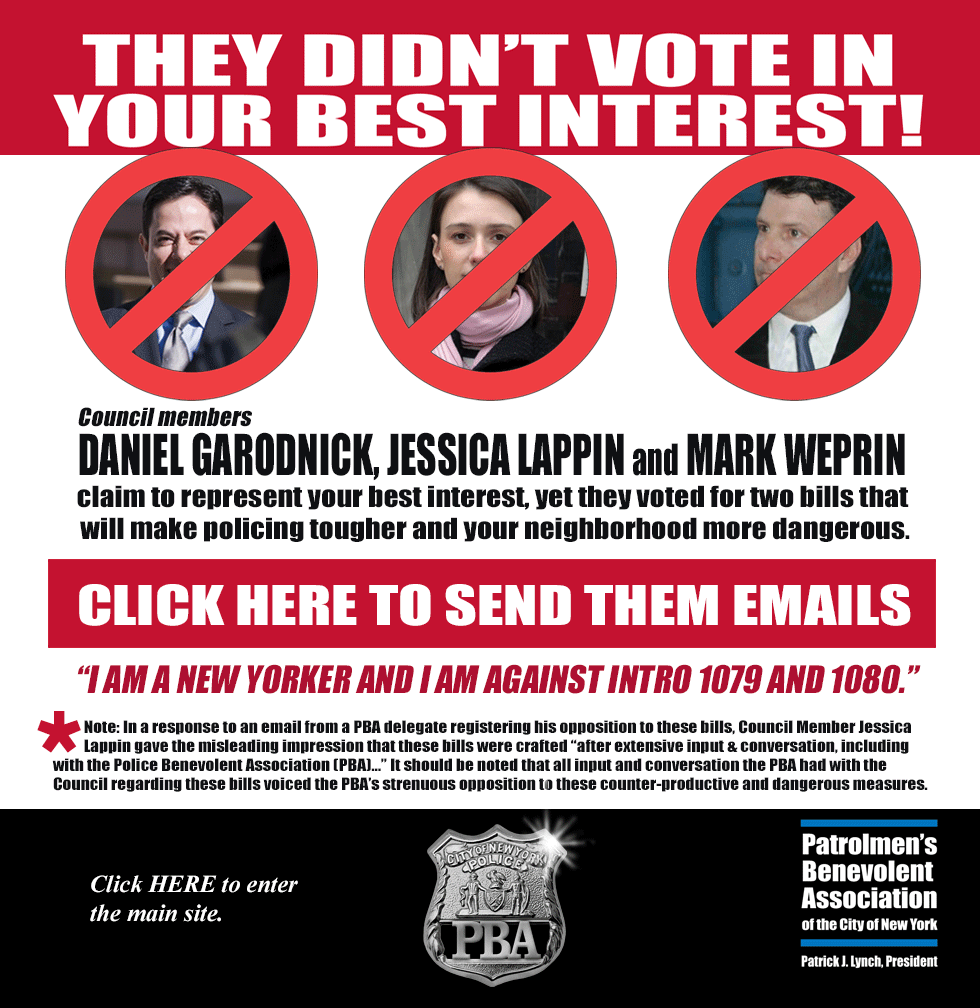NYPD unions warn members
 In New York City, the police unions are battling supporters of a bill that if signed into law would encourage people to sue officers if they think they have been wrongly stopped.
In New York City, the police unions are battling supporters of a bill that if signed into law would encourage people to sue officers if they think they have been wrongly stopped.
“A more accurate label for this dangerous legislation is the Criminal Protection bill,” said a radio ad broadcast produced by the Detectives Endowment Association. “Potentially it will stop cops in their tracks by encouraging criminals to sue an officer even though the cop is acting in good faith and in accordance with the Constitution. How effective could you be at your job if every task you performed correctly could result in you being sued?”
In an unusual collaboration, the city’s police unions are partnering with Mayor Michael Bloomberg in fighting the bill, which was passed with 40 votes, six more than the minimum needed to override a veto.
Both the Mayor and Police Commissioner Ray Kelly claim that the NYPD’s policy of stop, question and frisk, is a key reason that crime rates, especially homicides, have fallen so dramatically and they are determined to do everything possible to make sure the bill does not become law.
If the bill is signed into law, it would be illegal for officers to use race, ethnicity and other demographic identifiers as the primary reason for stopping or taking action against individuals. People who feel they were improperly profiled could sue in the state courts. Judges could not award monetary damages, but could issue orders halting the practice that led to the stop. They could also award legal fees against defendants which would include the officers who made the stop.
The city’s largest police union, the PBA, has targeted a handful of Council Members who voted in favor of the bill. The PBA produced a hard hitting flyer and distributed them throughout the city encouraging citizens to pressure councilors to change their vote if they were supportive of the bill.
Patrick J. Lynch, the PBA president, has advised his 23,000 members to patrol their beats with an eye toward protecting themselves from lawsuits. The bill that passed makes it easier to sue police officers for actions taken in the performance of their duty.
“As you may know, the New York City Council recently passed a bill that would allow police officers to be sued for stopping suspects based on descriptions that rely on ‘race, color, creed, age, alienage or citizenship status, gender, sexual orientation, disability or housing status,” Lynch said. “If this bill and its problematic provisions become law through an override of the mayor’s expected veto, all officers should take action if he or she sees a crime in progress, or if he or she sees that his or her life or the life of another person is in danger. Otherwise, concerning events not occurring in the officer’s presence, all officers should be careful not to initiate any law-enforcement action that could be construed as violating the new legislation and might subject the officer to legal action.”
Along with the PBA, the Lieutenants Benevolent Association, the Sergeants Benevolent Association and the Detectives Endowment Association have all advised their members to be extremely careful conducting stop-and-frisks if the proposal becomes law.
“In the past three weeks, several of our members have received charges and specifications issued by the Civilian Complaint Review Board,” the Lieutenants Union President Louis Turco said in a letter to members. All of the incidents involved stop, question and frisk, he said. “Therefore, we are advising our members to be especially cautious in regard to exercising stops. We understand and acknowledge that our members have a duty to protect the public and their fellow officers. However, our members should be cognizant of this increased scrutiny when deciding whether or not to stop an individual.”
The NYPD’s “stop and frisk” policies have become controversial and have been front page stories for both broadcast, print and online news outlets. There was a rally at City Hall in support of the bill and supporters of Deborah Rose from Staten Island and Councilman Leroy Comrie, both staged rallies.
“I live in the community where these acts of overly aggressive policing, stopping everybody randomly, is a way of life,” said Deborah Rose, who chairs the Council’s Civil Rights Committee. “And I have a son, who has been stopped numerous times. It’s long past time that we do something that addresses the fact that people’s basic civil rights are being infringed upon on a daily basis in such large numbers as a daily occurrence and as business as usual.”
Police union leaders all agree that despite claims that the profiling bill is not intended to go after the individual officer, but it will certainly end up that way.
Michael Palladino, president of the Detectives union said he is worried that the agency will refuse to admit that any of its policies are flawed.
“When their ideas are challenged, they usually blame it on the individual officer,” Palladino said. “They will prosecute officers in the trial room if a civilian judge comes back with a decision that’s against the NYPD. The legislation doesn’t give any protection to officers from retaliation by the agency”
What are your thoughts on the ongoing “stop and frisk” policies in New York City. We are anxious to hear from you.”














